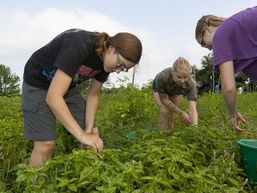 This article appeared in the 8/21 Ithaca Journal Paper, titled "Youth Farm Project teaches students to grow." "This summer about 22 Ithaca area high school students worked on the farm, growing onions, kale, collards, tomatoes, carrots, potatoes, winter squash, turnips and more". A summer farming program has high school students planting, picking, eating and earning green. The Youth Farm Project started five years ago as a collaboration between Three Swallows Farm, the Full Plate Farm Collective CSA, Lehman Alternative Community School and the Southside Community Center. Students are paid through local youth employment agencies to work on a 3.5-acre organic vegetable farm on Nelson Road, and the food they grow and harvest makes its way into Ithaca city school lunch and snack programs. This summer, about 22 high school students worked on the farm, which sits on land adjacent to the Ithaca Waldorf School. The farm hosts a diverse slate of crops; onions, kale, collards, tomatoes, carrots, potatoes, winter squash, turnips and more. Students work 20 hours a week and in the process they learn farming, cooking and teamwork skills while also developing a deeper awareness of sustainability and food justice issues, according to Joseph Amsili, who is a coordinator of the summer program and co-manages the farm with Ann Piombino. "Some kids come with a lot of gardening experience from home, but for a lot of kids it's completely new to them. So we teach kids how to learn to work hard and use their bodies. We show them they can be powerful and create something pretty meaningful," Amsili said. "One big part of our program is that we depend on having five or six kids returning from previous years that can be role models and leaders for the people who have just arrived on the farm." The food the students harvest is used in lunch programs in the Ithaca City School District, New Roots Charter School, the Full Plate Farm Collective CSA's u-pick garden, plus initiatives such as Beverly J. Martin Elementary School's Fresh Fruit and Vegetable Snack Program, GIAC's Market Box and Hot Meals programs, the Congo Square Market at Southside Community Center, and at a number of local food establishments. The Youth Farm Project, which is supported by funding from the Park Foundation as well as local businesses and individuals, is an offshoot of the not-for-profit Social Ventures, Inc. This was the second summer that Zoe Larson, 17, of Newfield, worked at the farm. The New Roots student said she was initially drawn to the program because she wanted to find a job that would keep her in shape over the summer. "I found that. It definitely keeps us in shape," Larson said. "It's a great environment and the people are awesome, and it's work that you can be proud of." Larson is serving as a crew leader with the program. She's long had an interest in how food is grown and the ways that society has become detached from that process, and she appreciates the boomerang effect of growing the same food that she and her peers consume at school. "My school gets some of the food and I can always tell," she said. "The potatoes are extra sweet, the lettuce is extra crispy. It's really cool." In addition to the summer program, the youth farm project also employs a handful of students during the school year. Larson hopes she can continue to work for the program several days a week, most likely storing food as well as prepping and canning jam, if her schedule allows it. Either way, she plans on returning to the farm for next summer before she ages out of the program, which hires teens between 14 and 18 years old. "Every single person that's come to the farm so far, even if they've been really skeptical about it, the people that I've seen have all absolutely loved it," Larson said. "They can be from totally different backgrounds...The group of people all work together so well in the environment. It's awesome." The seven-week summer program officially ended last week but there are still about about eight youths working on the farm, Amsili said. "Growing food is such a powerful teaching tool so far as empowering young people to see (the process) from a seed to a big plant to something that you're harvesting to something you're maybe selling at a farmers market or maybe seeing in your school lunch," Amsili said. "I think there's a lot of power in being able to see that we're all able to make that happen." Thanks to David Nutt and Simon Wheeler for a great article. Link to digital article: http://www.ithacajournal.com/story/news/local/2014/08/21/ithaca-youth-farm-project/14407819/
0 Comments
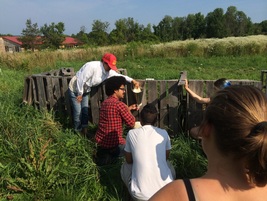 The last official week of work with the youth farm was very productive and it was sad to know we were nearing the end of the summer program. A part of our farming experience was to go through the process of chicken slaughtering from a non-conventional humane approach. For me I was a little hesitant at first since I don't eat meat, however I feel it is a highly important process to go through. Eating meat that is from animals that have been raised and killed with care and respect is a much better way to eat meat than eating meat from animals that had to live a conventional life in a factory where for their whole life they never even get held by human hands. We enjoyed the chicken at our Taughannock park picnic among other meals we made with the food we've grown. The picnic was delicious, we laughed a lot and had great conversations. We ended the week with a trip to what was one of my favorite farms the Good Life Farm which is an organic farm raising cows, turkey, chickens, guinea hens, and rehabilitating previously mistreated horses and using them for work like plowing fields. The Good Life farm is also growing vegetables and making and selling cider. In the last week we also played group games like tunnel of love which let us share our appreciation for each other and level the playing field which showed the diversity in our group and even with our differences we could still work efficiently together and create friendships. Working at the youth farm was one of the greatest experiences I've ever had and an unbelievable first job. I learned so much, grew more confident and made more friends. The people I've worked with are so kind, passionate about their work and treat you like an adult which is very refreshing for me. I hope to work another summer on the farm! Written by Lilly, Summer 2014 YFP crew member. Images: 1st- Lilly observes Rafael Aponte as he teaches us how to kill a chicken quickly and respectfully. 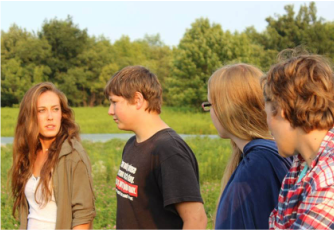 This was an eventful week as we prepared for our annual community dinner! On Monday all crews were assigned to organize, harvest, weed, and make other various decisions involving their respective fields in order to present these fields and to show families all the hard work that went into their cultivation. Both Monday and Tuesday my crew (the Thunderberrys) worked strenuously, planting row after row of kale in Field Four. Despite the blaring sun and heavy humidity, we persevered through this task, listening to music, talking, laughing, and having an overall surprisingly good time. It’s in moments like these that I remind myself how meaningful this work is. I’m sure that come fall, I will see the kale that we planted on my plate as a part of my school lunch and that the broccoli and cabbage also growing in field four, will be distributed throughout the community ending up at places like the Fresh Fruit and Vegetable Snack Program at BJM. I am grateful to know that the work I am doing on the farm is helping so many people. On Wednesday, we met at LACS and began the morning with an educational game led by Jeff Beem-Miller, who is a staff member in a lab at Cornell that focuses on the effects of climate change on agriculture. In the game, Cropopoly, each crew was assigned to a hypothetical farm in the future where extreme weather events have become more common and the government is both incentivizing and taxing agricultural activities that either mitigate man-made climate change or promote it. The crews had to make numerous decisions involving what to plant, how many fields to cultivate, how many kilograms of nitrogen fertilizer to add to crops, and how to invest money on the farm. The goal of the game was to make the most amount of money in a given amount of time. It was obviously evident that the crews planting only the typical industrial crops of corn and soybeans, made the most amount of money for the theoretical five years of farming. The crews that attempted to abide by more sustainable practices and plant more environmentally friendly crops ended up making a significantly less amount money. The point of this activity was to get us thinking about the various economic, ecological, and cultural trade-offs that farmers make and thinking how a climate change lens may influence these choices. In the short term, it is easier for farmers to profit more from solely corn and soybeans. While in the long term, a farmer who plants the same two crops over and over again will deplete soils of their organic matter, rely on external inputs: fertilizer, pesticides, seeds, which are costly, contribute to climate change, and overall create an agricultural system that is not resilient to climate change. In the long run, sustainable agriculture is more beneficial not only economically, but also environmentally, because soils will remain healthy year after year as a result of not being subjected to monoculture, intensive disturbance, pesticides/herbicides and the farmer will gradually gain a greater profit because they have reduced their need on off-farm inputs. After the fun On Thursday, all crews worked hard to prepare specific meals for that night’s dinner. My crew made pesto, a lot of pesto, using 6 pounds of freshly harvested basil from the farm. We ended up making a delicious pasta dish that seemed to be a big hit among the pesto lovers. Thursday’s dinner was an enjoyable success. It was fantastic seeing how well all the crews presented their fields and the meal was delicious. It is wonderful to see how food can foster connection, not only between people, but also between people and the environment. I am so grateful to be apart of the Youth Farm community. Written by Adrienne Wooster, 2014 Crew Leader Photo above: Adrienne presents field #4 with her crew members at the family dinner. 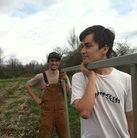 Boy time flies. Today while we were putting the plastic on the new hoop house, we reminisced about planting it during the first week of July and how it seemed like ages ago. On Monday, half the crew met downtown to help out at Loaves and Fishes (see Raffi’s section), while the other half went to Kestral Perch to glean currants. We gleaned and froze over 20 gallons of currants from Kestral Perch that we will access during the winter months to make our raspberry-currant-jalapeno jam. This is the fourth year that Katie Creeger has hosted us to glean berries at her beautiful berry farm. Thanks Katie. Raffi recounts his experience at Loaves and Fishes that Friday (the half of the group, went to Loaves and Fishes on Friday): Volunteering at Loaves and Fishes this year was a great experience. After the two crews moseyed into Loaves, we started work. The crew of volunteers that were in charge of running Loaves, were like a well oiled machine. We started out by bagging up bread for people to take home and setting all the tables. After a little break for breakfast, Simon dropped off two cases of kale and told us that the plan for the day was to make some sort of messaged kale salad for the lunch. Since this was my first year as a crew leader and most of the crew wasn’t exactly sure what a messaged kale salad was, I was taken a little off guard to say the least. Luckily my co-crew leader, Zofia, was a connoisseur of kale salads, so she led us to meet the challenge. Surprisingly in the end, without any help from adults, we were able to come together with a nice kale salad. Then Loaves opened its doors for lunch and although I spent the majority of time in the kitchen washing dishes, I enjoyed watching Youth Farmers eating and mingling with folks eating lunch. It was cool to come down to Loaves and Fishes as a crew and bring vegetables that we had helped grow. I would recommend volunteering at Loaves and Fishes for anybody that enjoys sharing a good meal with community. In addition, to visiting two awesome community partners, we spent time with Emma Frisch at the farm, who helped a group of youth make some delicious snacks for us all to enjoy after we were hard at work in the fields. Check out a beautiful blog post full of pictures and recipes that Emma Frisch wrote after her visit. http://www.emmafrisch.com/2014/08/summer-squash-pasta-with-chard-mint-pesto.html. To top it all off, we learned about cover crops together. Using cover crop fact sheets, youth were able to predict what cover crops would be useful for various realistic on-farm scenarios that Rafa and I detailed. Afterwards, we explored the cover crops of the farm: a tall field of cereal rye, mowed pathways of annual rye grass, and a dense field of red clover, half of which was plowed under to fertilize field #4 filled with fall brassicas. Finally, we all took turns hand broadcasting annual rye grass in the pathways of field #4 and buckwheat around the potatoes. This week we accomplished a lot on the farm: We seeded beets, radishes, transplanted fall crops, trellised hoop house tomatoes, put plastic on our new hoop house, and mowed and weeded. And most importantly we enjoyed each others company while doing it! By the Amsili Bros: Raffi and Joseph PS: Loved sharing my time at the Youth Farm this summer with my bro! 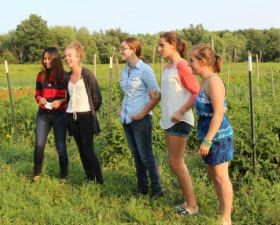 It’s been a busy week on the farm. We have been hard at work picking rocks, weeding, trellising tomatoes, mowing pathways, transplanting fall crops, harvesting and putting plastic on our newest hoop house. On Tuesday we were joined by the GIAC Skate Campers who worked hard in the fields with us for the morning and then helped our wonderful guests, Damon and Jackie, from Fruits and Roots Juice. Together we juiced kale, cucumbers, carrots, beets, apples and a touch of ginger to make a delicious drink to nourish ourselves for the afternoon. In addition to lots of work on our farm, we also spent time on two other farms this week. On Monday we visited Kestrel Perch and gleaned gooseberries. On Thursday we spent the day at Rocky Acres Farm, where our farmer friend Rafael Aponte is raising goats and chickens. What stands out most to me about this week was our development session on Wednesday. I began the morning a bit early, and spent time harvesting chanterelles in the forest with Dan and Amelia, before heading to LACS. As we hunted and harvested we talked about the excitement and satisfaction of foraging for food and being able to have an image of exactly where your food came from. Our development session was focused on learning about many of the health issues related to the way most Americans eat. This is my third summer working at the farm, and each year we have discussed these issues, mostly focusing on Obesity and Type II Diabetes. Even though the information was not new to me, it still shocked me to learn how many people are, or will be suffering from these problems. It angers me to understand the injustice in these numbers, and the way that socio-economic status plays a role in determining who is likely to experience these health problems. To balance out our discussion we shifted the conversation towards a brainstorm of ways that we, at the Youth Farm Project, can do to combat this inequality, and positively change the opportunities and health of those in our community. We hope to expand our work in the coming years, in order to educate more people (especially young people) about these issues, and reach out to folks who may not have access to local, healthy produce. Among many ideas, we discussed the possibility of becoming part of or starting more farmers markets in areas of town that have less access to supermarkets and farmers markets, as well as donating more of our produce to food pantries in the area, especially in Danby, where our closest neighbors reside. As part of the session we were asked to think about a meal that left us feeling completely satisfied. Each person wrote a brief summary of what they ate, who they ate with, where they ate and how they felt afterwards. Several of us shared with the group. Each person who shared talked about the process of preparing the meal with friends and/or family and then eating with those same people. So often in our culture it seems that we forget the importance of creating and sharing food with a community, and the meaning this holds for all of us. The meal that we prepared on Wednesday couldn’t have better embodied this idea of delicious food and community. Our guest chef Rachel Ostlund helped us prepare Fritattas with swiss chard, onions, garlic and chanterelles, Kale and Toasted Bread Salad, Beet and Bean Salad, Zuchini Muffins with Lemon Glaze and our very own “YFP Soda” with cucumbers, mint and lemon basil! Before we ate our meal we folded fancy paper towel napkins, set a long table and sat down together. I felt appreciative as I ate the meal, enjoying the beautiful fact that as a community we had grown, prepared and eaten this food together. After reading this I hope you will take the time to prepare and share a meal with some of the wonderful humans in your life! Written by Rayna, 2nd year crew leader 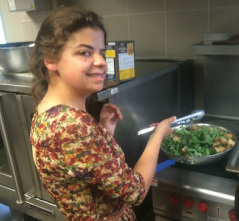 Week 3: 7/14-7/18 Hi, it’s Vicky. This is my second summer at the Youth Farm and my first year as a crew leader. The summer here seems to be flying by and we’re already three weeks in! People are becoming closer and building stronger bonds; it’s great. And there is so much smiling. Everyone has blessed me with hilarious conversations and so much laughter. This week was a particularly great week at the farm; good weather (not too hot or cold), in-depth conversations and lots of laughing. Everyone on the farm did a lot of hard, fulfilling work this week and through it, we were smiling and getting very dirty. Just my crew alone seeded over twenty flats of basil, zucchini, and lettuce in one morning. Then as a whole group, we discussed the meaning of sustainable farming. Wednesday was our weekly development session at LACS. We had two local leaders in the community, Kirby Edmonds and Jemila Sequira, come to speak to us. Kirby Edmonds, Dorothy Cotton Institute Fellow and Coordinator of Training for Change, led an informative discussion about structural poverty in Tompkins County. Kirby shared that the local employment/education/prison system gives children in poverty very few options for escaping poverty. Simply put, youth in poverty can end up with two options for employment: 2-3 minimum wage jobs or illegal activity such as selling drugs. Also, the public education system doesn't prepare youth to break out of this poverty cycle. This, on top of the fact that poverty can restrict access to capital to pursue higher education or to start a business. Kirby didn’t stop his talk at the hard to break cycle of poverty, but showed that public education, workforce training, and other types of social justice organizations have so much untapped potential to help us all attain ownership in the way we provide for ourselves, family, and community through living wage jobs, access to capital. Next, Jemila, Whole Community Project coordinator, shared how she became a leader in the local food justice movement and shared projects from the community. The chef for this week was Shimels Damtew, owner of Shimel's Ethiopian Cuisine, a pop-up food stand, came and cooked some delicious beef tips, bean/carrot saute, and greens with us. I wish I knew how to describe this with more detail, but I do know that the food was amazing! Thursday and Friday, we planted potatoes for four hours. It was a lot of potato planting but my crew had a lot of help from other crews so we got three rows done and after that, we stood and marveled at how quickly and efficiently something can get done if you have ten kids all setting their minds to it. Written by Vicky, Summer 2014 Crew Leader, and Joseph. 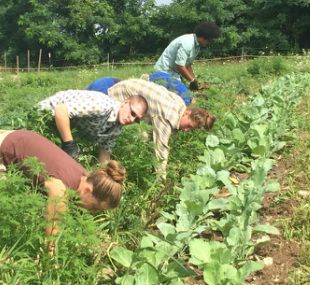 Zofia (center) works with her crew to weed the collards. Zofia (center) works with her crew to weed the collards. Week 2: 7/7-7/11 We started off the week strong by splitting into four smaller crews that we will continue to work with for the remainder of the summer. We worked on many tasks such as staking, trellising tomatoes, seeding, mulching pathways and of course WEEDING. It was lovely watching the crews work together and start to get to know one another as individuals rather than just faces in the crowd. On Wednesday we spent the day at LACS in our first development session of the summer. We worked in crews to break down the process behind one item of food. By doing this we discovered just how convoluted our food system is and the fact that most of the time we (the consumer) aren’t even aware of where our food comes from. We were lucky enough to have a guest speaker: Jhakeem Haltom, founder and manager of Congo Square Market, who gave a new, eye opening perspective on what it means to live in modern society. He captivated the room and held our attention throughout with his views on the modern day slave saying that “the worst kind of slave is the one who does not know that they are a slave.” By the end nobody knew what to say- still reeling from the power of his statements and the questions that he posed. In addition to Jhakeem, we had the opportunity to work with Frank Purrazzi to build an unforgettable lunch menu. We made homemade ramen with greens, eggs, and some delicious kimchi with fresh ingredients from the farm. It was an excellent development session that left everyone thinking about some really important issues that effect us all whether we are aware or not. Something that stuck with me this week was the question “what is a food system?” posed by Joseph and Rafa. As we sat in the barn, one could almost feel the ideas forming- the sound of gears turning, connections being made. It wasn’t necessarily the question itself, but the fact that the group took the time to analyze and break it down to make the answer their own. The discussion left many with a new perspective on what we are doing here on the farm and what we can continue to do in the larger community to improve and build upon this concept of creating a sustainable food system. All in all it was a really strong week and I look forward to seeing where the summer takes us and what knew ideas will be formed. By Zofia, crew leader summer 2014 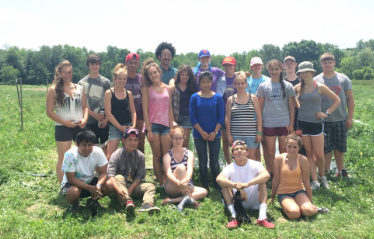 On July 1st, twenty high school age youth arrived to work on the first day of the Ithaca Youth Farm Project's Summer Program. The first few days of the summer program serves as an orientation to the Youth Farm. The orientation period is filled with various games/ice breakers to get to know one another and to create a safe environment from the beginning. In addition, we spend thoughtful time together in the barn to set goals for the summer, to commit to working agreements and common standards, and to introduce everyone to the Youth Farm's mission, vision, and history. Last, but not least, we spend time exploring the fields that we are farming this year and we get a good taste of the hard/rewarding work that will fill our summer. (picture: The 2014 Summer Crew stands proudly in front of the weeded onion beds and pathways). The Youth Farm is proud to present an annual report from the 2013 Year. As a young organization this represents a huge step for us as we improve our organizational structure. Check it out!
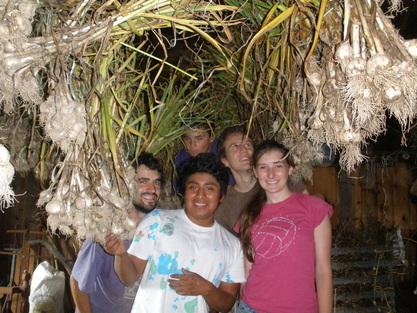 Simon and part of his crew beneath the drying garlic. Simon and part of his crew beneath the drying garlic. This article appeared in the Ithaca Journal on September 28th and was written by Majorie Olds. I changed a few details to correct some minor inaccuracies. "...While at Guilford, Simon remembered how he liked to eat all kinds of unhealthy food as a teen, and how some of his habits were not good for him. During his years at LACS, he got to know adults and kids who talked about getting healthier fruits and vegetables into the schools. From his LACS friends, he learned healthier personal habits; teens find it smoothest to learn from each other. He started asking himself, “Who grew this food? Where did it come from?” He saw the connection between food (growing healthy food in healthy soils), and justice (grown by people treated fairly). Everyone needs and deserves access to healthy food. Everyone who provides food deserves healthy, fair work conditions. When Simon came back from his first year at college, he met four dynamic people who were starting a youth farm: Dan Flerlage, a LACS science teacher; Katie Church, of the Full Plate Community Supported Agriculture (CSA); Kirtrina Baxter, at the time the assistant director of the Southside Community Center; and Anna Piombino, a farm manager.The four founders brainstormed about high school kids growing food while learning about the complete food cycle and how everyone is affected by the food system we have. The first year, as the founders tried to bring their ideas to life, the Youth Farm Project was small and slow to flourish. Simon volunteered consistently that first summer. Mostly, he remembers the waist-high weeds, the heat and the lush potential of the farm project. Simon graduated from Guilford College, and he returned to the Youth Farm. The intersection of teens and farming appealed to Simon when he first encountered the Youth Farm project. Now, four years later, it seems like an even better choice. A lot has happened in the last four years. Simon recounts some of its many successes: “This summer, 20 high school students ran the farm with adult support. The teens really got into the YFP. They took their job of growing food seriously and understood that working in the fields is the mainstay of the project. They also had fun as they ‘built community.’ Whatever barriers to friendships existed at the beginning of the summer were surmounted by the end of summer; everyone was excited to come to work.” In addition to growing more food than ever before, the YFP also added chickens to their project in 2012. In past years, the YFP borrowed or traded labor for the use of other farms’ equipment. This summer, with generous support from local funders, they were able to purchase some basic equipment. What YFP workers can’t make or trade for, they will continue to buy from locally owned stores, because they see themselves as part of the interconnected local economy. This summer, YFP deliveries were made to Collegetown Bagels and Agava; in the coming weeks, produce will be delivered to local schools and to the Full Plate CSA. At the end of the summer and later this fall, the YFP will be making currant-raspberry-jalapeno jams and various salsas. They’ll sell these products at farmers markets and at Congo Square, and share with Loaves and Fishes. What they can’t can, cook or share, they will freeze.“It’s taken time for people to get to know us, but we are continuing to become better farmers and become more connected with others each year, and people in the community appreciate that,” Simon said.Now that the YFP is winding down for the summer, Simon is turning to his newest challenge — to bring what he has learned to incarcerated teens. Simon and Anna Susmann, co-owner with husband Herb of the beautiful Besemer Greenhouses, have created a program where teens will grow vegetables in a small greenhouse while talking about gardening, world food distribution, world hunger and all the intertwined topics. Born in Guatemala, Simon arrived in Ithaca to live with Gail and Zellman Warhaft when he was 6 months old. He wonders what his life would have been like if his parents had not found him. He feels he has been surrounded by all that he needed to become the person he is today, and this propels him to share his good fortune with others. “My parents helped us think about others,” he said. “I am extremely fortunate to be in my current situation, and I want to help others have opportunities, too. I see value in others, and I try to help others realize their potential.” Simon has seen the YFP grow stronger each summer. They’ve faced challenges, and they’ve made adjustments adding lots of mulching, cover crops and crop rotations. The weeds are minimal now with just routine maintenance. Everything is good and will only continue to get better". |
Archives
August 2022
Categories |
||||||
The Youth Farm Project | 24 Nelson Road, Ithaca, NY 14850 | [email protected]
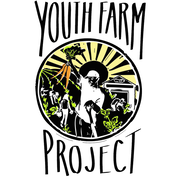
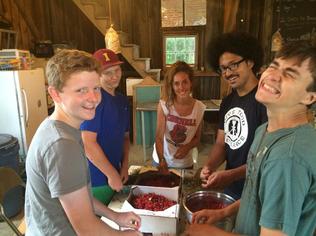
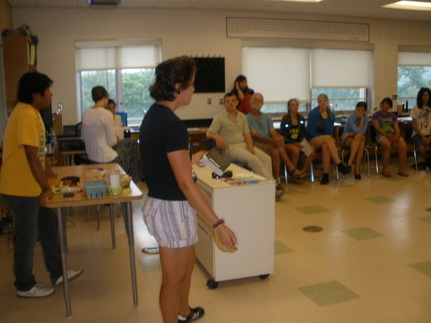
 RSS Feed
RSS Feed